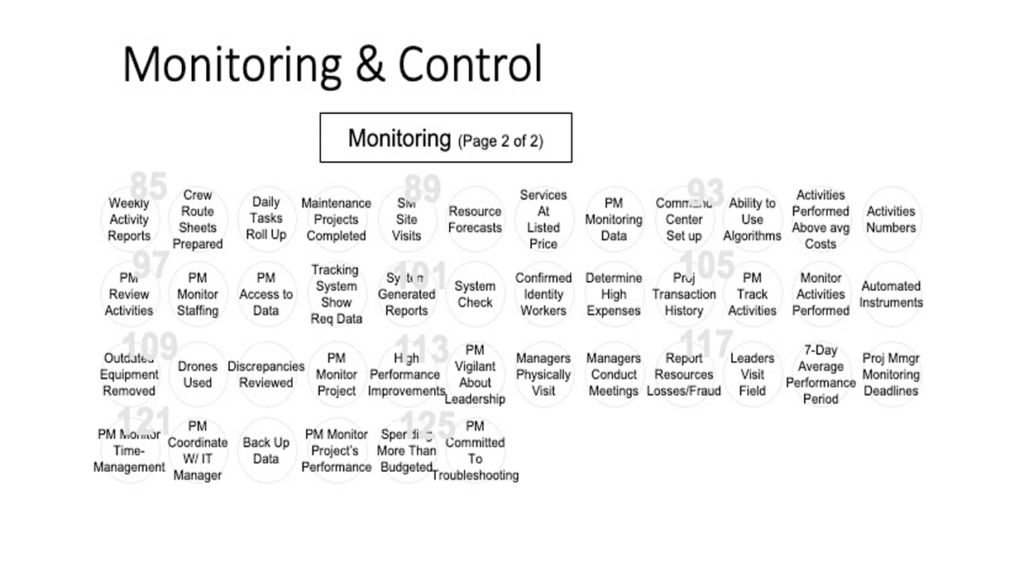
85 – Are weekly activity reports prepared and distributed, timely? (Yes = good)
86 – Are daily task/ activity reports/ crew route sheets prepared and distributed, timely? (Yes = good)
87 – Do the daily tasks roll up, so that they can be reported in the weekly activity report? (No = bad)
88 – Does PM ensure that maintenance projects are completed in a timely fashion? (Yes = good)
89 – Does SM make formal/ informal site visits to better understand the situation? (Yes = good)
90 – Does PM provide SM, team/ activity leaders, contractors with resource forecasts/ projections? (Yes = good)
91 – Can PM explain what services s/he is receiving (getting) at the listed price? What’s included and what’s excluded? And why? (No = bad)
92 – Are activity managers/ PM monitoring data/ webcams performance – every day? (No = bad) To see:
*The route the project is taking?
*Where they are on the route?
*Where their current progress is going to take them?
93 – (On big projects) Has a command center been set up with bulletin boards/ screens to track key metrics and share information? (Yes = good)
94 – Does PM have the ability to use algorithms to look for anomalies in performance reports? (Yes = good)
95 – Are any activities being performed at costs far above average or far behind schedule?
96 – Are any activities numbers beginning to creep (unfavorably) in the wrong direction that have not popped up on the radar?
97 – Does the project manager attempt to review the activities/ commitments/ deliverables nearing the deadline and ensuring that those that are close are done as soon as possible? (Yes = good)
98 – Does project manager continuously monitor staffing levels? (Yes = good)
99 – Does project manager have consistent access to the data? (No is blue)
100- Does the data-driven tracking system contain and show all required data? (Yes = good)
101 – Does information reported to the system, get reported out in system-generated reports? (Yes = good)
102 – Does the system have the capability to check on the status of activities? (Yes = good)
103 – Has/ can/ does PM confirmed the identity of each worker/ technician/ manager, etc on the team with attendance rosters/ (e.g., photo identification cards/ fingerprints/ iris scans) – to prevent fraud? (Yes = good)
104 – Can/ has PM determine what s/he has spent on a daily/ weekly/ monthly basis and determine if expenses appear high, low or just right? (No = blue)
105 – Does PM have the ability to review the project’s transaction history, in various categories over the previous few months? (No = blue)
106 – Does PM track activities, parts, contracts to determine/ predict when they are likely to break/ fail/ expire/ soon to expire? (Yes = good)
107- Does PM need to monitor activities performed by various time periods (e.g,, Morning vs evening; weekday vs. weekend) to determine if performance differences exist? (Yes = blue)
108– Can automated instruments be used to monitor long running tests, which may exceed 12 hours? (Yes = blue)
109 – Are test instruments regularly tested and calibrated? Is outdated equipment physically removed from service, once discovered? Do validation records exist? (Yes = good)
110 – Can drones or artificial intelligence be used to monitor any part of the project? (eg, safety; loss prevention)
111– Are discrepancies reviewed to ensure it’s not: An internal error has occurred? Intentional fraud? Are more widespread than previously reported? (Yes = good)
112 – Does PM/ QA monitor the project on-site and/ or in the field to verify headcount and ensure that ‘real’ employees (not ghost employees – who have left without being removed from the payroll) actually exist and are on-the-job working on the project? Are efforts made to recoup payment for any missed work hours? (No = bad)
113 – Are drastic/ unusually high performance improvements which have occurred over a short period of time – independently verified? (No = blue)
114- Does PM remain vigilant about leadership (communications, morale, teamwork, etc and management (key performance indicators) issues when things appear to be operating normally? (Yes = good)
115 – Have managers physically visited the off-site areas – doing tasks they are responsible for? (Yes = good)
116- Do managers conduct meetings/ regular resource inspections to control waste, fraud, loss, theft? (Yes = good)
117– Are managers required to report resources losses/ fraud? (No = bad)
118- Does PM/ team/ task leaders do field visits to ensure that personnel are not idle? (Yes = good)
119- (Evaluation periods can differ as necessary) Can PM evaluate a 7-day average performance period against a prior 7-day average performance period? (Yes = good)
120- Is project manager aware of and monitoring approaching critical near-term deadlines or concerns?
121– Does PM monitor the time-management of employees/ contractors who are paid for less than a 40-hour week? (No = bad)
122- Does PM coordinate with IT manager to: Ensure that software patches and updates are current for all devices that connect to the internet? Change factory-installed settings/ configurations/ usernames/ passwords? Ensure that project vendors also practice vigilance? (No = BAD)
123- Ensure that team and vendors regularly back up data? (No = BAD)
124 – Does the PM regularly monitor the project’s performance at various checkpoints, stages, phases, between regular reporting periods? (Yes = good)
125 – Are there any activities spending/ about to spend more than their budgeted costs/ time estimates? (Yes = bad)
126- Is the PM committed to troubleshooting on a daily basis? (Yes = good)
